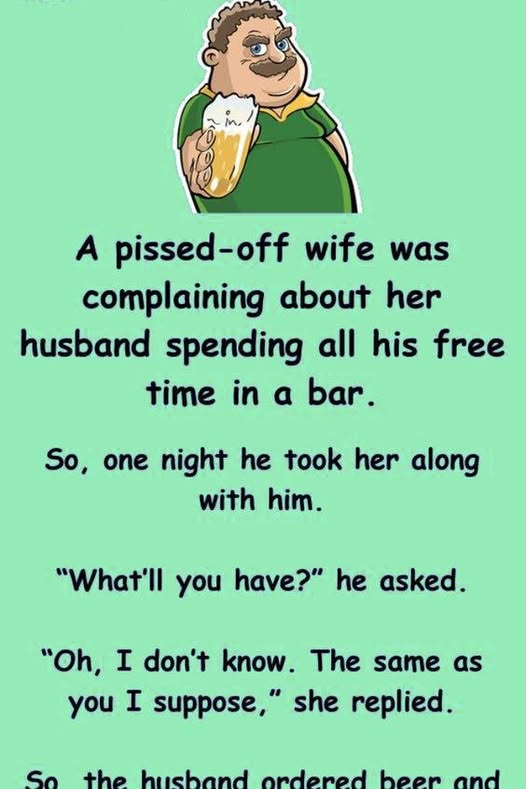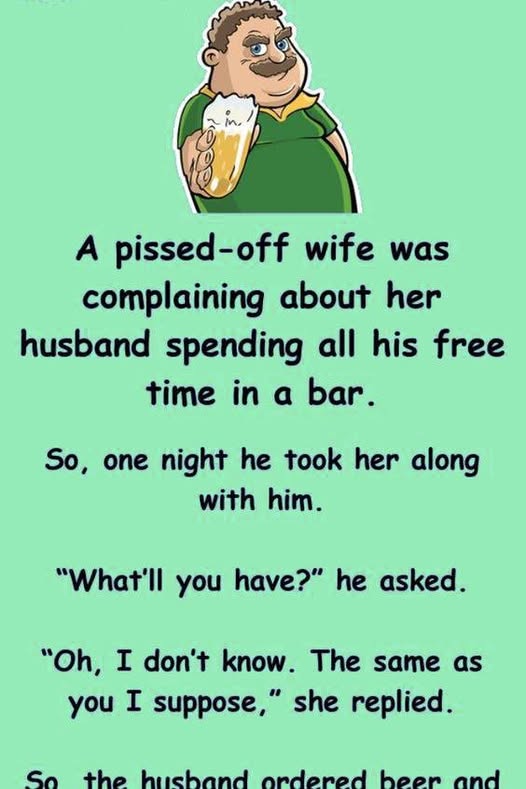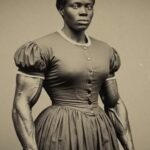For years, Tom and Elaine Miller had the same argument every Friday night. It started small, like so many married quarrels do — a question tossed across the dinner table, a sigh, then another round of the same old complaint.
“Do you ever think,” Elaine said one evening, her fork tapping the plate, “that you spend more time at the pub than you do at home?”

Tom didn’t look up from his mashed potatoes. “It’s not that bad.”
“It’s every Friday, Tom.”
“And Saturday,” he added.
Her eyes widened. “You’re joking.”
He smiled. “Mostly.”
It wasn’t that Tom was a bad husband. He worked hard — a mechanic by trade, with grease on his hands and an honest grin that made people trust him. But after a week spent fixing other people’s cars and listening to other people’s complaints, the Fox & Hound Tavern was his escape. The noise, the laughter, the dartboard, the same bar stool he’d sat on for a decade — it was his small piece of sanity.
Elaine didn’t see it that way.
“Every week you disappear,” she said one night as he tied his boots. “You come home smelling like beer and peanuts, and you tell me it’s relaxing. I don’t see what’s so relaxing about sitting in a noisy room full of drunks.”
He sighed, grabbed his jacket, and said, “It’s not about the beer, love. It’s about the company.”
She crossed her arms. “Then maybe I should come see what all the fuss is about.”
That stopped him. He turned, halfway to the door, and raised an eyebrow. “You serious?”
“Dead serious,” she said. “Tomorrow night, I’m coming with you.”
Tom grinned. “Alright then. Let’s see if the Fox & Hound passes your inspection.”
The next evening, Elaine dressed as though she were meeting royalty — hair perfect, lipstick flawless, perfume sharp enough to slice through cigarette smoke. Tom tried to warn her. “It’s a pub, not a fashion show.”
She waved him off. “And I’m not walking into your little beer cave looking like a slob.”
When they arrived, the Fox & Hound was its usual self — dim lighting, the faint hum of classic rock on the jukebox, and a crowd that knew each other too well. The bartender, Pete, nodded at Tom like clockwork. “Evening, mate. Usual?”
“Make it two,” Tom said, motioning to Elaine.
Pete raised an eyebrow but poured the drinks without question — two tumblers of amber whiskey with a splash of soda.
Elaine perched on a stool beside Tom, scanning the room with suspicion. “So this is it? This is what you abandon me for every week?”
“Pretty much,” Tom said. “It’s peaceful.”
“Peaceful?” She pointed toward a group of men arguing over the darts board, their laughter echoing across the room. “They sound like a pack of wild dogs.”
“That’s Gary, Nick, and Ben,” Tom said. “Gary cheats, Nick lies about scores, and Ben drinks too fast. It’s a system.”
Pete set the drinks down. Tom lifted his glass. “Cheers.”
Elaine hesitated, then copied him. “Cheers,” she said, taking a dainty sip. The moment the liquid hit her tongue, her face twisted. She sputtered and coughed, setting the glass down with a clatter. “Good Lord, that’s awful!”
Tom laughed, nearly spilling his own drink. “What’d you expect? Candy?”
“It burns!” she gasped. “Why would anyone drink that voluntarily?”
“That,” Tom said, “is whiskey. The cure for everything that’s wrong and half the things that aren’t.”
She wiped her mouth, glaring. “It tastes like paint thinner.”
He leaned closer, grinning. “And you think I’m out here having the time of my life every night?”
Elaine paused, still grimacing, then looked around. The dartboard men cheered as someone hit a bullseye. A middle-aged woman in a leather jacket danced alone near the jukebox. The air smelled of fried food and cheap beer.
For the first time, she saw what Tom meant — not that it was glamorous, but that it was simple. No one was pretending to be anyone here. They laughed too loud, complained too much, and went home poorer but lighter.
“Alright,” she said after a moment, “so it’s not exactly the Ritz.”
“Never claimed it was.”
“But do you honestly enjoy this?”
Tom took another sip, shrugged. “Not the whiskey. The people.”
Elaine softened slightly. “You mean Pete, the bartender?”
“And Gary, Nick, Ben,” Tom said. “We’ve all known each other for years. We talk about everything — work, football, life. It’s not about escaping you, Elaine. It’s about escaping the noise in my own head.”
She studied him. “You could’ve just said that.”
“I did. Multiple times. Usually while putting on my boots.”
For a moment, neither spoke. Pete came by with another round — one for Tom, a soda for Elaine this time. She smiled politely.
As the night went on, she began to relax. She even played a round of darts (poorly), and when the jukebox switched to an old Rolling Stones track, she caught herself tapping her foot.
At one point, Pete leaned over the counter and said, “Didn’t think we’d ever see the missus here.”
Tom laughed. “Me neither.”
Elaine smiled. “I wanted to see what kind of trouble he gets up to.”
Pete winked. “You see it now?”
“Oh yes,” she said, mock-serious. “The terrible kind where men complain about taxes and women steal their fries.”
Everyone laughed. Even Elaine.
By closing time, she’d learned two things: that Tom’s so-called “escape” was really just a small circle of weary souls finding laughter in the ordinary — and that whiskey was, indeed, vile.
On the drive home, she leaned her head against the window, still chuckling. “You know,” she said, “I thought I was going to catch you doing something awful. Turns out you were just bored.”
“Exactly,” Tom said. “That’s the beauty of it.”
She turned to him. “Maybe next week I’ll join again. But maybe I’ll bring wine.”
He shook his head. “They’ll never forgive me if you do.”
She smiled, settling back in her seat. “Then maybe it’s better I let you have your little sanctuary. Just don’t make it every night.”
Tom nodded. “Deal.”
When they got home, she paused at the door and gave him a sly look. “For the record,” she said, “that drink of yours — still disgusting.”
He laughed. “And you think I’m out enjoying myself?”
The line made them both burst out laughing.
Later that night, as Elaine drifted off to sleep, the faint smell of whiskey still lingered in the air — smoky, bitter, strangely comforting. For the first time, she understood: it wasn’t the drink that drew him there, nor the noise or the people. It was the pause — that brief, weightless space between work and home, where the world stopped asking for things.
And maybe, she thought, everyone needs a place like that.


